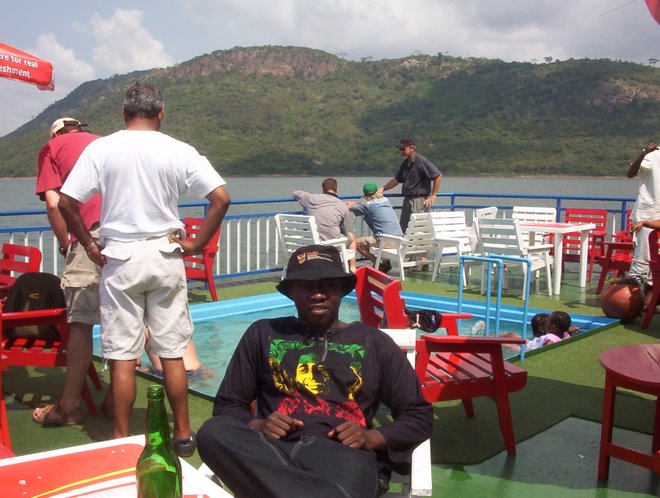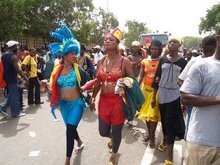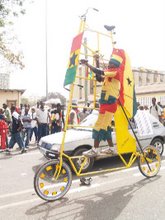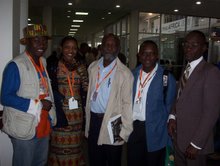KMA signs MOU with KNUST to solve development problems in Kumasi
THE Kumasi Metropolitan Assembly (KMA) has signed a memorandum of understanding (MOU) with the Kwame Nkrumah University of Science and Technology (KNUST) to establish a formal collaboration which will promote joint projects aimed at solving the development problems of the city of Kumasi.
Under the five-year agreement, KNUST is to provide technical support for the preparation and implementation of the City Development Strategy Programme which will cover infrastructure, tourism, local economic development, revenue generation and sanitation.
The two parties do not intend to enter into any contract which will create legal and financial obligations between them under the MOU but to facilitate and develop genuine and mutually beneficial programmes and activities.
Under the five-year agreement, KNUST is to provide technical support for the preparation and implementation of the City Development Strategy Programme which will cover infrastructure, tourism, local economic development, revenue generation and sanitation.
The two parties do not intend to enter into any contract which will create legal and financial obligations between them under the MOU but to facilitate and develop genuine and mutually beneficial programmes and activities.
 The Vice-Chancellor of KNUST, Prof K. K. Adarkwa, and the Kumasi Metropolitan Chief Executive, Madam Patricia Appiagyei, appended their signatures to the MOU in Kumasi on Wednesday.
The Vice-Chancellor of KNUST, Prof K. K. Adarkwa, and the Kumasi Metropolitan Chief Executive, Madam Patricia Appiagyei, appended their signatures to the MOU in Kumasi on Wednesday.Under the agreement, the KMA is to collaborate with KNUST in the introduction of a new Master’s degree programme in Urban Management aimed at helping to build the capacity of the KMA in the management of the metropolis.
Madam Appiagyei described the collaboration between the two institutions as long overdue.
“I believe this is one of the best and finest universities in the sub-region and even beyond and it is a step in the right direction that this institution is being made to have an impact on the development of the city of Kumasi,” she said.
She said Kumasi used to be known as the Garden City of West Africa, saying that if the city was to regain its past glory, then KNUST had a vital role to play.
“I must say that it is not by chance that KNUST is located in the city. It is by design and it is, indeed, strategic. The time has come for us to feel and acknowledge the impact and presence of the university in the city,” she said.
She acknowledged that there had been previous arrangements between the KMA and KNUST which, for one reason or another, did not work.
“This time round, let us work hard at this collaboration, cut out all the bureaucratic tendencies which will hinder the establishment of the linkages and let us work at a faster pace,” the Metro Chief Executive said.
As part of a programme to beautify the city of Kumasi, the KMA last year set out to redevelop its 10 existing roundabouts through private sector participation and as of now all the roundabouts have been adopted by corporate bodies.
The development work to be undertaken by the corporate bodies includes horticultural work and the installation of imposing edifices.
Apaet from the roundabouts, there are several leisure parks dotted all over the city which need to be worked upon as part of the beautification programme and it is in these areas that the technical assistance and involvement of KNUST will be greatly required.
Madam Appiagyei said it was the expectation that the city in which the university associated with science and technology was located should be well laid out, beautiful and must not be found wanting in the area of development.
“Posterity will not forgive us if this collaboration is stifled,” she said.
She, therefore, challenged KNUST to bring its skills and expertise, research findings and the relevant projects it had undertaken to bear on the development of the city of Kumasi.
 Other areas to be tackled by the KMA under the MOU are the provision of logistical support within its means for KNUST in its research activities, the consideration of the creation of a Chair in Urban Management at KNUST, the opening up of facilities to staff and students of KNUST for purposes of carrying out research, and accepting students from KNUST for vacation training in its facilities.
Other areas to be tackled by the KMA under the MOU are the provision of logistical support within its means for KNUST in its research activities, the consideration of the creation of a Chair in Urban Management at KNUST, the opening up of facilities to staff and students of KNUST for purposes of carrying out research, and accepting students from KNUST for vacation training in its facilities.The KNUST on the other hand is to support the KMA in initiating and executing projects aimed at revitalising the Central Business District (CBD) of Kumasi with particular reference to Kejetia, assist in the management of the city through provision of technical support, carry out research which would anticipate the problems of the metropolis and advise on possible solutions.
Other areas include making available to the KMA existing data in the form of plans, students’ theses, staff research reports as may be required by the KMA, help the KMA to plan and execute policies aimed at protecting the water bodies in the metropolis within the context of achieving the general ornamental development of the metropolis.
The KNUST is also to introduce programmes aimed at re-training middle level personnel of KMA in the requisite skills and competencies, introduce programmes aimed at providing continuing professional development of staff of KMA, provide priority to qualified KMA staff who wish to enrol on graduate programmes and encourage its students to sensitise the general public to issues of sanitation and development control through the organisation of seminars and workshops.









































